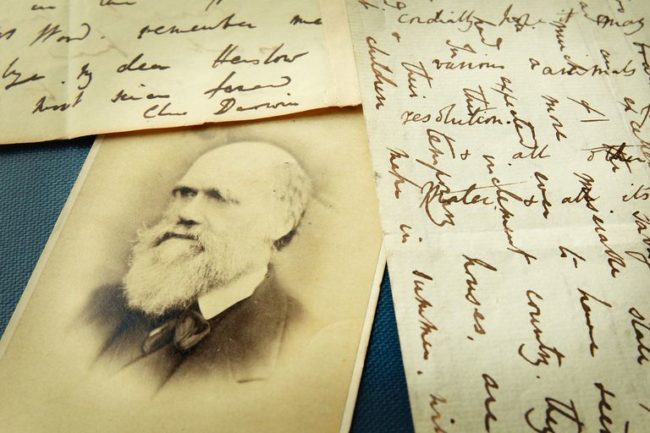
The 12th February is officially International Darwin day. I tend to have a Charles Darwin posting up to mark the occasion, and so here are a few samples from previous years …
- 2015: Was Darwin a racist, and does evolution promote racism? – #DarwinDay (Hint … No)
- 2016: Why is Today Darwin Day and what is happening?
- 2017: It is Darwin day – 12th Feb
- 2018: Debunking 5 common Darwin myths – #DarwinDay
If curious to read more about who he was and what he did, then a good place to start is perhaps the Wikipedia page that lays it all out.
I’ll quote-mine a few snippets …
…Darwin published his theory of evolution with compelling evidence in his 1859 book On the Origin of Species, overcoming scientific rejection of earlier concepts of transmutation of species.[9][10] By the 1870s, the scientific community and a majority of the educated public had accepted evolution as a fact.
… Darwin has been described as one of the most influential figures in human history,[22]
Rejection
To this day there still exist some who reject evolutionary biology for religious reasons and instead prefer to opt for older creation mythology. In one sense this is perhaps understandable. For many religion is a human experience that often rests upon a foundation that has deep emotional roots, hence anything that threatens that safe haven will face resistance.
Darwin’s idea is now well-established with multiple lines of evidence and does not simply rest upon his original writing, it has all come a long way since then. If curious to learn more, then start here …
Lines of evidence: The science of evolution
At the heart of evolutionary theory is the basic idea that life has existed for billions of years and has changed over time.
Overwhelming evidence supports this fact. Scientists continue to argue about details of evolution, but the question of whether life has a long history or not was answered in the affirmative at least two centuries ago.
The history of living things is documented through multiple lines of evidence that converge to tell the story of life through time. In this section, we will explore the lines of evidence that are used to reconstruct this story.
These lines of evidence include:
- Fossil evidence
- Homologies
- Distribution in time and space
- Evidence by example
If interested is arguing about it, perhaps by asserting that “God did it by Magic”, and that Darwin is a satanic plot, then please don’t engage me. Instead, write up your scientific “evidence” and publish it within a credible peer-review science journal. Your disagreement is not with me, but instead is with the entire scientific community and so those are the people you need to begin with.
There have been attempts to do exactly this, but it has not exactly gone all that well. The handful of scientific papers that promote religious ideas under the banner of science tend not to survive any scrutiny. Here is a link to a posting I did on the topic about 7 years ago, and not too much has happened since then to change this.
Darwins idea does not simply survive, but it thrives due to the overwhelming quantity of robust evidence, and also advances. He opened our eyes and enabled us to truly begin to understand our origins and where we came from.
It really is not about science vs religion
For most humans his profound evidence-based insight is accepted, and that holds true regardless of any specific religious cultural inheritance we might have. For those that do also generally embrace specific religious ideas but don’t advocate a literal interpretation, they find that evolutionary biology does not conflict, but instead it rests upon the thought “That is how God did it”. For all, it grants an insight to how the diversity of life came about. His remarkable insight persists and thrives because that is what all the available evidence tells us.
Darwin’s own words
Perhaps the best way to finish off is to quote Darwin himself, so I’ve selected several paragraphs that I find resonates with me …
It has often and confidently been asserted, that man’s origin can never be known: but ignorance more frequently begets confidence than does knowledge: it is those who know little, and not those who know much, who so positively assert that this or that problem will never be solved by science. – Descent of Man – volume I, “Introduction”, page 3
As man advances in civilisation, and small tribes are united into larger communities, the simplest reason would tell each individual that he ought to extend his social instincts and sympathies to all the members of the same nation, though personally unknown to him. This point being once reached, there is only an artificial barrier to prevent his sympathies extending to the men of all nations and races. If, indeed, such men are separated from him by great differences in appearance or habits, experience unfortunately shows us how long it is, before we look at them as our fellow-creatures. … This virtue, one of the noblest with which man is endowed, seems to arise incidentally from our sympathies becoming more tender and more widely diffused, until they are extended to all sentient beings. As soon as this virtue is honoured and practised by some few men, it spreads through instruction and example to the young, and eventually becomes incorporated in public opinion. – The Descent of Man – volume I, chapter III: “Comparison of the Mental Powers of Man and the Lower Animals — continued”, pages 100-101
One last quote …
A man who dares to waste one hour of time has not discovered the value of life. – volume I, chapter VI: “The Voyage”, page 266
